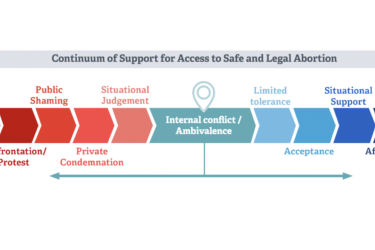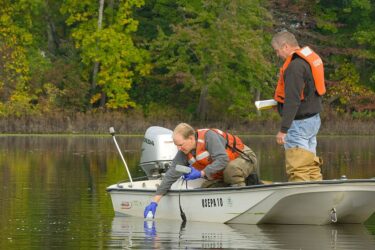
Many reporters have covered the far-reaching impacts of the Supreme Court Dobbs ruling that overturned Roe v. Wade. Most articles have focused on how the ruling affects those who can become pregnant — but reporters also need to be aware of how restricting access to reproductive care affects the ability of researchers to conduct ethical studies, as a recent article in Science discussed.
There is already a long history of researchers excluding women from clinical studies, which makes the potential impact of having less data on women in restricted states even more concerning.
Knowing the challenges that researchers face can help journalists ask questions about the choices they made in study design and in choosing study sites. This can have a substantial impact on whether the researchers can get sufficient and accurate data.
Key takeaways
- States with more restrictive abortion policies differ from those with greater access to abortion in terms of demographics, social determinants of health, health care and treatment access, and health care needs.
- Data from studies conducted in states with greater abortion access may not be as generalizable to people living in states with greater abortion restrictions.
- Conducting ethical research for certain drugs may be more challenging in states with greater abortion restrictions because of the potential risk a drug might have for a fetus.
- Researchers themselves may feel less willing to travel to states with abortion restrictions if they are capable of becoming pregnant, potentially reducing the amount of research conducted in those states.
- Journalists should ask questions of researchers about whether decisions they made were influenced by a state’s abortion policies and, if so, how those decisions affected the data they were able to collect.
Since Dobbs, about half of U.S. states have restricted abortion in some way, and it’s banned (or very nearly banned) in 13 states, according to the Guttmacher Institute, one of the most reliable resources on reproductive health data in the U.S. These same states share much more than abortion policy, however.
The more restrictive abortion is in a state, the more likely it is to have higher percentages of children in poverty, uninsured children, uninsured women, newborns with a low birth weight, teen births, infant deaths, and maternal deaths. It’s also less likely to have paid family leave, expanded Medicaid, and a minimum wage above $7.25, as an excellent New York Times investigation showed.
All of that means the demographics and health care needs — and therefore the potential effectiveness of drugs and other interventions and access to those treatments — will likely differ in states with abortion restrictions versus those without.
Yet there are a number of ways those abortion restrictions create challenges for researchers.
“Notably, limited access to abortion can pose risks to clinical research participants and potentially compromise the scientific and social value of some research,” wrote the authors of the Science article.
Here are some of the biggest challenges abortion restrictions pose to conducting research, according to the authors of the Science article:
- Medical studies, by definition, expose participants to unknown risks, and those risks extend to the fetus in participants who become pregnant. Particularly for drugs where fetal harm could be more likely, the participants may feel abortion is the best option if they become pregnant during a study — but they may not have that option.
- Studies often require participants to undergo regular pregnancy tests, but doing so could reveal a pregnancy that would otherwise have resulted in a miscarriage before the participant knew they were pregnant. Knowing of the pregnancy and then having a miscarriage could raise suspicion that the person sought an abortion in states where that is illegal and potentially expose them to legal risks.
- It’s possible that fewer people capable of becoming pregnant will enroll in clinical trials if they don’t have access to abortion in case they become pregnant during the trial, increasing gender disparities in research data.
- Researchers may feel reluctant to collect data on adverse pregnancy-related outcomes if doing so exposes them or the participant to legal risks, which reduces the value of the research when those data aren’t available.
- Clinical research staff may face legal risks if participants want to seek an abortion during a trial but the state has legal penalties for helping someone obtain an abortion, such as the Texas “aiding and abetting” law.
The Science article then describes action researchers should consider in developing a study:
- Stay abreast of current laws in all states where they are conducting or might conduct a study, though this can be challenging given how rapidly the legal landscape is changing with abortion policy and the fact that many clinical trials last several years.
- Evaluate how suitable a site is for a study in terms of abortion policies and the risks those pose, including whether it will be possible to recruit enough participants. The authors of the article state outright that if they can’t ensure the risks are reasonable given the “potential scientific and social value” of the study, “researchers and sponsors should consider not pursuing research at that particular site.” Journalists can consider asking researchers whether they made decisions like these in choosing their sites.
- Researchers should prepare staff for how to handle participants’ requests for information about abortion in states where that could be legally risky.
- Researchers should take extra care about protecting participants’ confidentiality related to pregnancy during the trial. They recommend getting an NIH Certificate of Confidentiality that can prevent compelled disclosure of protected information. It’s possible this could offer protection in cases of civil or criminal prosecution, but it hasn’t been tested in the courts yet.
- Discussion of the risk of pregnancy and of abortion options, or lack thereof, should be an integral part of the informed consent process for those considering participating in clinical research.
- Participants should have reliable access to effective contraception during trials.
- Researchers need to explicitly look for and manage “both expected and unexpected harms” related to pregnancy that do arise during a trial, despite their best efforts to avoid them.
- Institutional Research Boards (IRBs) should consider abortion policies in states where researchers are planning studies to determine whether it’s possible to ethically conduct a study there. If, for example, a study is investigating a cancer drug that is known to cause birth defects and it will enroll people who could become pregnant, it might not be ethical to conduct the study there.
Despite all these precautions and recommendations, the Dobbs ruling may have further effects on clinical studies that haven’t arisen yet. Journalists should also be on the lookout for new developments and consider ways lack of abortion access could impact studies that perhaps even the researchers themselves have not yet considered.









